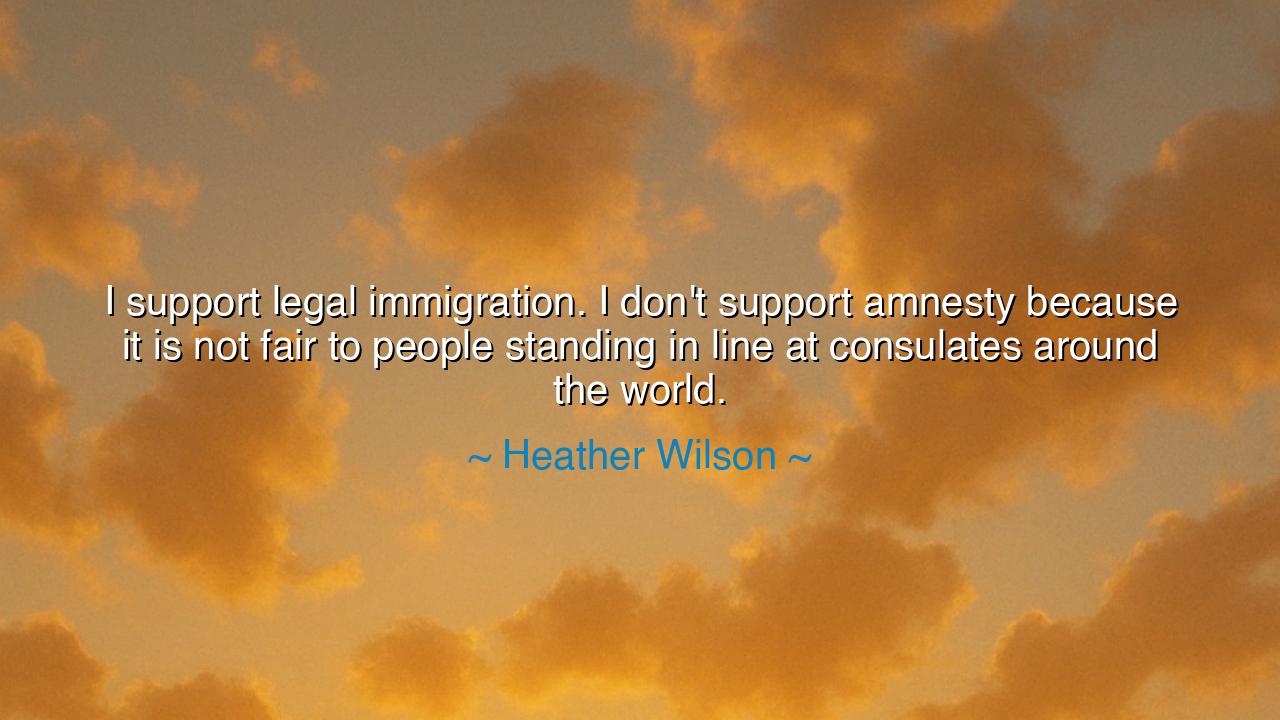
I support legal immigration. I don't support amnesty because it
I support legal immigration. I don't support amnesty because it is not fair to people standing in line at consulates around the world.






There are words that rise not from hatred, but from the ancient soil of justice — words that speak of the balance between mercy and fairness, between compassion and law. When Heather Wilson declared, “I support legal immigration. I don’t support amnesty because it is not fair to people standing in line at consulates around the world,” she was not merely speaking of policy, but of principle — the eternal human struggle to reconcile hope with order. Her words remind us that civilization is built not only upon open doors, but upon rules that protect the dignity of all who wait in patience. For to welcome the stranger is noble, but to do so unjustly — favoring the lawbreaker over the law-abider — is to wound the very heart of fairness itself.
The origin of this quote lies within the long and turbulent debate over immigration reform in the United States — a nation forged by immigrants, yet forever wrestling with how to govern the gates of its own promise. Heather Wilson, a congresswoman and Air Force veteran, spoke these words amid rising tension between those calling for mass amnesty and those demanding strict enforcement. She sought to carve a middle path — one that honors legal immigration as a sacred covenant between individual effort and national welcome, while rejecting amnesty as a betrayal of those who obey the process faithfully. To her, the issue was not of compassion versus cruelty, but of fairness versus favoritism — the moral duty to uphold both humanity and the rule of law.
In her words lives a timeless echo, for this dilemma is not new. Across the ages, societies have wrestled with the tension between inclusion and justice. The ancient Romans, in their empire of vast diversity, granted citizenship slowly, to those who proved loyalty and service. When they began to bestow it too freely, the sacred value of Roman citizenship diminished, and with it the strength of their unity. So too in modern nations, when borders blur and the distinction between lawful and unlawful fades, the sense of shared responsibility — the foundation of community — weakens. Wilson’s warning, though spoken in modern times, is the same wisdom the ancients once guarded: that law must remain the keeper of balance, lest freedom consume itself.
Her invocation of those “standing in line at consulates around the world” is not rhetorical — it is deeply human. It speaks to the millions who, with hope and patience, follow the process: submitting documents, waiting years, and enduring uncertainty. These are not mere statistics; they are families who trust that fairness still governs the world. To grant amnesty to those who bypass the line, Wilson argues, is to dishonor their sacrifice. It is as if a runner, trained and disciplined, were forced to watch as another cuts across the field and is crowned the victor. Such a sight breeds not unity, but bitterness — and where bitterness takes root, faith in justice withers.
Yet, Wilson’s words are not devoid of compassion. To support legal immigration is to celebrate the courage of those who seek a new life by rightful means. It is to recognize that immigrants — lawful immigrants — are not strangers, but partners in the building of nations. They bring with them the same yearning that once drew settlers to the New World, the same hope that forged the American dream. In honoring their lawful journey, Wilson upholds not only the authority of law, but the dignity of the immigrant. Her vision, though stern, is humane: a call for mercy that does not destroy order, and for opportunity that does not abandon discipline.
History offers many examples of how justice and mercy must walk hand in hand. When Moses led his people through the desert, he did not open the Promised Land to all without law; he gave commandments, for freedom without law leads to chaos. When the founders of America built their republic, they welcomed immigrants, but they also built processes to preserve the sanctity of citizenship. Each generation must rediscover that wisdom — that the gate of compassion must swing on the hinges of justice. To remove those hinges, even in kindness, is to see the gate collapse upon all who enter.
Thus, the lesson of Heather Wilson’s words endures beyond her time and her country. Law is not the enemy of love; it is its guardian. To respect law is to respect the equality of all who seek its protection. The way forward, then, is neither the closing of borders nor the erasure of them, but the crafting of a system that honors effort, patience, and integrity. Let the nations remember: those who wait in line for freedom deserve more than those who leap over it. And let the people remember this truth, as old as civilization itself — that justice without compassion is cruelty, but compassion without justice is folly. Only when both stand together can a nation remain both strong and kind, and only then can it call itself truly free.






AAdministratorAdministrator
Welcome, honored guests. Please leave a comment, we will respond soon